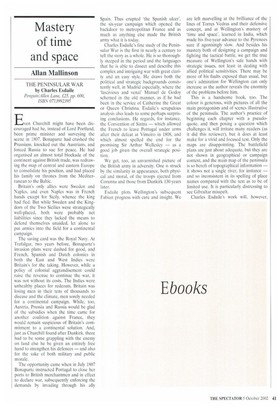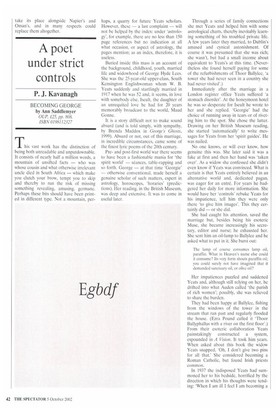Mastery of time and space
Allan Mallinson
THE PENINSULAR WAR by Charles Esdaile Penguin/Allen Lane, £25, pp. 600, ISBN 0713992395 Even Churchill might have been discouraged had he, instead of Lord Portland, been prime minister and surveying the scene in 1807. Bonaparte had crushed the Prussians. knocked out the Austrians, and forced Russia to sue for peace. He had organised an almost total blockade of the continent against British trade, was redrawing the map of central and eastern Europe to consolidate his position, and had placed his family on thrones from the Mediterranean to the Baltic.
Britain's only allies were Sweden and Naples, and even Naples was in French hands except for Sicily, whence the king had fled. But while Sweden and the Kingdom of the Two Sicilies were strategically well-placed, both were probably net liabilities since they lacked the means to defend themselves unaided, let alone to put armies into the field for a continental campaign.
The saving card was the Royal Navy. At Trafalgar, two years before, Bonaparte's invasion plans were dashed for good, and French, Spanish and Dutch colonies in both the East and West Indies were Britain's for the taking. However, while a policy of colonial aggrandisement could raise the revenue to continue the war, it was not without its costs. The Indies were unhealthy places for redcoats. Britain was losing men in their tens of thousands to disease and the climate, men sorely needed for a continental campaign. While, too, Austria. Prussia and Russia would be glad of the subsidies when the time came for another coalition against France, they would remain suspicious of Britain's commitment to a continental solution. And, just as Churchill found after Dunkirk, there had to be some grappling with the enemy on land else he be given an entirely free hand to strengthen his defences — and also for the sake of both military and public morale.
The opportunity came when in July 1807 Bonaparte instructed Portugal to close her ports to British merchantmen and in effect to declare war, subsequently enforcing the demands by invading through his ally Spain. Thus erupted 'the Spanish ulcer', the six-year campaign which opened the backdoor to metropolitan France and as much as anything else made the British army what it is today.
Charles Esdaile's fine study of the Peninsular War is the first in nearly a century to tell the story as a whole. He is so thoroughly steeped in the period and the languages that he is able to dissect and describe this complex and intriguing war with great clarity and an easy style. He draws both the political and strategic backgrounds consistently well, in Madrid especially, where the 'lascivious and venal' Manuel de Godoy schemed in the old manner, as if he had been in the service of Catherine the Great or Queen Christina. Esdaile's scrupulous analysis also leads to some perhaps surprising conclusions. He regards, for instance, the Convention of Sintra — which allowed the French to leave Portugal under arms after their defeat at Vimeiro in 1808, and which almost spelled the end for the promising Sir Arthur Wellesley — as a good job given the overall strategic position.
We get, too, an unvarnished picture of the British army in adversity. One is struck by the similarity in appearance, both physical and moral, of the troops ejected from Corunna and those from Dunkirk 130 years later.
Esdaile plots Wellington's subsequent Fabian progress with care and insight. We are left marvelling at the brilliance of the lines of Torres Vedras and their defensive concept, and at Wellington's mastery of 'time and space', learned in India, which made his five-year advance to the Pyrenees sure if agonisingly slow. And besides his mastery both of designing a campaign and fighting the tactical battle, we get the true measure of Wellington's safe hands with strategic issues, not least in dealing with allied political sensitivities. There may be more of his faults exposed than usual, but one's admiration for Wellington can only increase as the author reveals the enormity of the problems before him.
This is a handsome book, too. The colour is generous, with pictures of all the main protagonists and of scenes illustrative of the peninsula. The author's practice of beginning each chapter with a pseudoquote, and then posing a question which challenges it, will irritate many readers (as it did this reviewer), but it does at least make for a vivid and focused text. Only the maps are disappointing. The battlefield plans are just about adequate, but they are not shown in geographical or campaign context, and the main map of the peninsula is so bereft of topographical information — it shows not a single river, for instance — and so inconsistent in its spelling of place names compared with the text as to be of limited use. It is particularly distressing to see Gibraltar misspelt.
Charles Esdaile's work will, however. take its place alongside Napier's and Oman's, and in many respects could replace them altogether.





































































 Previous page
Previous page